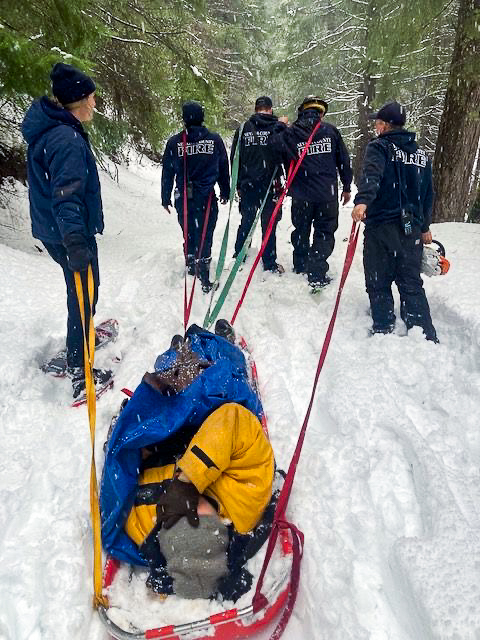Hours into the rescue mission, paramedic Jessica Farmer realized her toes were completely numb.
It was a late afternoon in early March, and Farmer and her partner found themselves standing in thigh-deep snow above a steep canyon in the Sierra foothills outside of Grass Valley. The pair were still dressed in their standard uniforms, without snow pants or heavy socks, heading slowly toward a cabin deep in the woods, where a man had called hours earlier complaining of severe chest pain.
“Any other situation in life, and I think I would have given up at that point,” said Farmer, 36, a seasoned emergency responder and homeschool teacher to her two children. “This is too hard. But this is a 911 call. This is a patient having a heart attack.”
Earlier that afternoon, Farmer and her partner, Clarence Ortega, sped out of Sierra Nevada Memorial Hospital in their Mercedes van ambulance, snow pelting the windshield. They eventually reached an unplowed road and were forced to stop several times to help local fire department crews shovel out stranded cars blocking their route and chain saw fallen trees into heavy rounds and toss them off the hill.
 Jessica Farmer (left) and other emergency workers pull a man having a heart attack down a snow-covered road. (Courtesy of Jessica Farmer)
Jessica Farmer (left) and other emergency workers pull a man having a heart attack down a snow-covered road. (Courtesy of Jessica Farmer)
At that point, her radio crackled, and dispatch notified her that the patient’s pain was getting worse.
“You have to make this work,” Farmer told herself, she said. “This is going to be the hardest day of your life. But you have to make this work.”
Farmer and Ortega abandoned the ambulance on the slushy road and started trudging on foot through fresh powder, sinking like a posthole with each step.
Eventually, about a mile down the blanketed road, a large cabin with a wraparound deck came into view.
Seeing it was “just pure happiness,” Farmer said.
They rushed into the house and found a man in his 70s lying in bed grabbing his chest, his skin strikingly pale, sweat glistening on his forehead. Farmer quickly checked his pulse and then explained that the road was “disastrous” and they would have to walk him out.
“He then tells us that he has a broken hip,” she said.
Farmer took a deep breath, pulled off her wet socks, replacing them with a few dry pairs borrowed from the patient, and wrapped her feet in plastic bags and duct tape in an effort to keep them dry.
In the man’s garage, Farmer found a small kid’s sled pinned high in the rafters, along with a large blue tarp, which she and Ortega used to wrap the patient up like a burrito.
“We pulled him out like a dogsled team,” she said, describing the hour-long ordeal of dragging him on the sled through the snow back to the ambulance — with the help of the fire department emergency crew. They quickly loaded him inside and headed over slick roads back to the hospital, about five hours since they had left earlier that day.
Farmer helped admit the man to the emergency room. She later learned he had been transferred to the ICU and recovered, and was discharged several days later.
Such an extraordinary rescue has become par for the course this winter for a growing number of emergency responders in rural communities in California, which has been pummeled by 12 massive atmospheric river storms since the beginning of the year, and is bracing for a 13th on Tuesday. The storms have delivered hurricane-force winds and a seemingly endless amount of precipitation, washing out roads, toppling trees, and isolating many residents — leaving those in need of immediate medical care in a particularly tenuous position.



















